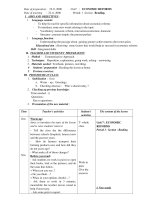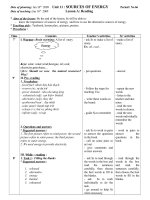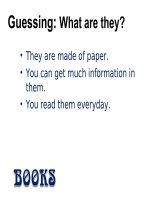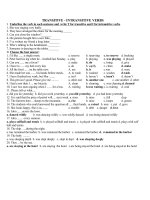E 12 - UNIT 11 - READING
Bạn đang xem bản rút gọn của tài liệu. Xem và tải ngay bản đầy đủ của tài liệu tại đây (2.57 MB, 14 trang )
Guessing: What are they?
They are made of paper.
They are made of paper.
You can get much information
You can get much information
in them.
in them.
You read them everyday.
You read them everyday.2. Do you often read books?
3. What kind of books do you enjoy
reading most/ least?
4. How do you read books?
Unit 11: Books – Reading – Before you read
1. What are they doing?
To swallow
To swallow
[
[
'swɔlou]
'swɔlou]
(v)
(v)
Nuốt (đọc ngấu nghiến)
Nuốt (đọc ngấu nghiến)
Unit 11: Books – Reading
VOCABULARY
To dip into:
To dip into:
(v) Chấm vào (đọc qua
(v) Chấm vào (đọc qua
loa)
loa)
To taste:
To taste:
(v) Nếm (đọc thử)
(v) Nếm (đọc thử)
“
“
hard- to- pick- up-
hard- to- pick- up-
again”
again”
Không thể đọc lần nữa
To digest
To digest
[dai
[dai
’
’
dʒest]
dʒest]
(v) Tiêu hóa (đọc và suy
(v) Tiêu hóa (đọc và suy
ngẫm)
ngẫm)
To chew
To chew
[t∫u:]
[t∫u:]
(v) Nhai ( nghiền ngẫm)
(v) Nhai ( nghiền ngẫm)
“
“
hard- to- put- down
hard- to- put- down
”
”
Không thể bỏ xuống
được
[
[ teist
]
]
To chew không thể đọc tiếp nữa
To digest không thể đặt xuống
To swallow đọc qua loa
To dip into đọc ngốn ngấu
To taste đọc và suy ngẫm
Hard to pick up again nghiền ngẫm
Hard to put down đọc thử
Checking Vocabulary
True or False statement prediction
1.Francis Bacon advised you to read different types
of books in the same way.
2.When you taste a book you read it carefully from
the beginning to the end.
3.You can swallow a book when you find a good
story and have time to enjoy it.
4.Books with good stories are often described as “
hard –to – put – down”.
5.Television has replaced books altogether.
1. Francis Bacon advised you to read
different types of books in the same way
2. When you taste a book you read it
carefully from the beginning to the end
3. You can swallow a book when you find
a good story and have time to enjoy it
4. Books with good stories are often
described as “ hard –to – put – down”
5.Television has replaced books
altogether
F
F
T
T
F
1. How many ways of reading are there?
1. How many ways of reading are there?
2. When might you “swallow” a book?
2. When might you “swallow” a book?
3. What should you do before starting to
3. What should you do before starting to
read a book carefully and slowly?
read a book carefully and slowly?
4. What are the advantages of television
4. What are the advantages of television
over books?
over books?
5. What are the advantages of books over
5. What are the advantages of books over
television?
television?
Unit 11: Books – Reading – Task 3
Task 3: Answer the questions according to the
information in the passage.
1. There are three.
2. When you find a good story and have time
to enjoy it.
3. Read a few pages to see if it’s the one you
can read and understand it easily.
4. Television can bring you the information and
stories with colour, pictures and actions.
5. Books are still cheap way to get information and
entertainment. And moreover you can keep a book
forever and read it at any time and again and again.
H
R
I
L
L
E
R
C
R
A
F
T
R
O
M
A
N
C
E
L E V O
S C I E N E
F
I
T
O
N
C
M
I
C
B
G
R
A
P
H
Y
A A
A
B
B
B
H F
F
F
L
R
J
S
M X
Z
K J W C
S
T
G
Q
V
C
W
G
D
R
S
W
T
J
V
Q
W
R
K
Y
V
U
Unit 11: Books – Reading – After you read
a. If you like books with an exciting story
especially one about crime or spy, read a t
b. If you enjoy reading stories about love affairs, a r is
the right book for you.
c. A n is a story long enough to fill a complete book, in
which the characters and events are usually imaginary.
d. A s fiction is a type of book that is based on imagined
scientific discoveries of the future.
e. If you want to learn how to knit or work with wood, you
should buy a c book.
f. F books tell stories from the author’s imagination.
g. A c books tell stories through pictures.
h. A b is about a person’s life written by somebody
else.
Learn new words by heart and write a
report about a book you like best.
Prepare lesson 2 ( Speaking )









